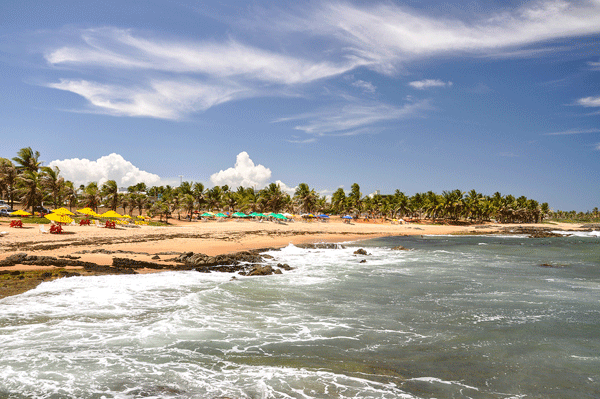How to Rent a Home in Brazil
Summary: Renting a home in Brazil for the first time can be daunting. You probably have so many questions: Do I need a lawyer? Do rentals come with appliances? How do I find good rentals? How do I choose the right neighborhood? The list goes on and on. Here are answers to some of the top questions plus insight from our members living in Brazil.

Navigating the process of renting a home in Brazil for the first time can feel overwhelming. Numerous questions might arise: Should I consult a lawyer? Are appliances typically included in rentals? How can I discover quality rental properties? Which neighborhoods will best suit my needs? These are just the tip of the iceberg. Dive in for answers to these pressing questions and gain insights from our members who've made Brazil their home.
"Relocating to a new country can be an exciting yet challenging experience, and one of the first tasks you'll face is finding a place to live. If you're planning to move to Brazil, this guide will provide you with essential information about renting an apartment, from finding a property to understanding the legal requirements and costs involved.
How Do You Find a Rental Property in Brazil?
There are several ways to find rental properties in Brazil. Online property portals such as ZAP Imóveis, Viva Real, and OLX are popular and provide listings across the country. Local newspapers also have property listings, and real estate agencies can provide personalized assistance. It's also common to find "for rent" signs on properties.Does Brazil Have an MLS Type System?
Brazil does not have a Multiple Listing Service (MLS) like in the United States. However, real estate agencies and online portals provide extensive listings, making it relatively easy to find available properties.Do Brokers Have Licenses and How Do I Know if They Are Licensed?
Yes, real estate brokers in Brazil must be licensed by the Regional Council of Realtors (CRECI). You can verify a broker's license by asking for their CRECI number and checking it on the CRECI website.Should I Buy or Rent in Brazil?
Whether to buy or rent depends on your personal circumstances and long-term plans. Renting can be a good option if you're not sure how long you'll stay or prefer flexibility. Buying can be a good investment but involves more paperwork and upfront costs.Is It Difficult to Find Rentals in Brazil?
Finding rentals in Brazil can be challenging, especially in popular cities like Rio de Janeiro and São Paulo. However, with patience and the help of a good real estate agent, you can find a suitable property.What Documents Are Required When Renting an Apartment in Brazil?
Typically, you'll need a copy of your passport, proof of income, and a Brazilian tax ID (CPF). Some landlords may also require a Brazilian guarantor or a deposit.Do I Need a Lawyer When Renting an Apartment in Brazil?
While not mandatory, it's advisable to have a lawyer review your rental contract to ensure your rights are protected. Legal fees can vary, but expect to pay around R$500 to R$1,000.How Long Is the Typical Lease For?
The typical lease in Brazil is for 30 months, but it's common to negotiate a break clause after 12 months without penalties.Do I Have to Pay a Deposit?
Yes, a deposit equivalent to one to three months' rent is typically required. This is returned at the end of the lease if the property is in good condition.What Other Upfront Costs Are There When Renting?
Other upfront costs can include the first month's rent, a broker's fee (usually one month's rent), and possibly a key money payment (a controversial and sometimes illegal payment to the landlord).Are Utilities Included?
Utilities are usually not included in the rent and can be quite expensive, especially electricity. You'll need to set up and pay for utilities yourself.Are Furnished or Unfurnished Rentals More Popular in Brazil?
Both furnished and unfurnished rentals are available, but unfurnished properties are more common. Unfurnished properties often don't include appliances, while furnished properties usually include basic furniture and appliances," said one expat living in Brazil.Expats Talk about What Type of Housing They Live In
"I live in an apartment, no I don't think its typical most live in hostels or share with other students," said one expat living in Rio de Janeiro.
"I live in an apartment. I cannot recommend a house due to security concerns. None of my Brazilian coworkers live in single family homes and my employeer recommends against it. Almost all apartments are built for families not for singles," wrote a member in Sao Paulo.
"There are 41 units within the resort, mostly owned by foreigners. There are a few owned by Brazilians but the others are mostly from Europe or UK. Each of the units vary in size but 150m2 is about average for the villas with 2 stories. Ours has 3 bedrooms and 2 bathrooms and a roof veranda that includes a Jacuzzi. Pipa Beleza Resort is one of the leading and most modern resort in the area and several more have or are being built as we speak," commented one expat who made the move to Praia de Pipa.
"Brasilia for me; it’s a modern city, I lived there so many years ago, spacious roads, organized transportation, security everywhere specially in shopping centers, night bars on weekends are really full of people and nice beer with a really colder glass, people are more friendly , most of tourists enjoy their weather and cheap food and amenities around the city, I like the food markets with several options and organic products, I left Brasilia in the 90s right now it’s much better organized, I have family and lots of friends, this is the place that I will return and retire Questions let me know, thanks," remarked one expat living in Brazil.
Expats Talk about How they Found their Home
"I choose Jardins because it is one of the few places where you can walk to the pharmacy, supermarket ect. The downside is that I spend 3 yes three hours a day to and from the office (7 km each way).. My office is in a commercial area and living there would be depressing," commented an expat living in Sao Paulo.
"We started in 2006 researching the internet for property to the north of Natal in Rio Grande do Norte State. After finding some villa's just completed and for sale located to the north of Natal we then made contact with the real estate agent in Natal and made dates to visit. While there we heard of Praia de Pipa, Brazil and did more internet research at the hotel and made contact with the company building Pipa Beleza Resort. After driving down and visiting the resort we bought the last villa available for sale in 2007," said an expat in Praia de Pipa.
"One of the best ways to find a place to live in Brazil is to use online rental platforms, such as Airbnb, Olx, and Quinto Andar. You can also search on classified ad websites like Classificados and Rentalia, or real estate listings by city on websites like ZAP. Additionally, you can make use of other online marketplaces such as Craigslist, Facebook Marketplace and Fazenda. If you prefer more traditional methods, you can find listings of rental properties in local newspapers or contact a real estate broker to help you find a place. Additionally, you can find a wide array of furnished and unfurnished rental apartments and houses listed in popular Brazilian cities on websites such as VivaReal and Imovelweb," remarked one expat who made the move to Brazil.
About the Author
 Joshua Wood, LPC joined Expat Exchange in 2000 and serves as one of its Co-Presidents. He is also one of the Founders of Digital Nomad Exchange. Prior to Expat Exchange, Joshua worked for NBC Cable (MSNBC and CNBC
Primetime). Joshua has a BA from Syracuse and a Master's in Clinical and Counseling Psychology from Fairleigh Dickinson University. Mr. Wood is also a licensed counselor and psychotherapist.
Joshua Wood, LPC joined Expat Exchange in 2000 and serves as one of its Co-Presidents. He is also one of the Founders of Digital Nomad Exchange. Prior to Expat Exchange, Joshua worked for NBC Cable (MSNBC and CNBC
Primetime). Joshua has a BA from Syracuse and a Master's in Clinical and Counseling Psychology from Fairleigh Dickinson University. Mr. Wood is also a licensed counselor and psychotherapist.
Some of Joshua's articles include Pros and Cons of Living in Portugal, 10 Best Places to Live in Ireland and Pros and Cons of Living in Uruguay. Connect with Joshua on LinkedIn.
Additional Information:
- Brazil Guide
- Healthcare & Health Insurance in Brazil
- Members Talk about Healthcare & Health Insurance in Brazil
- Best Places to Live in Brazil
- Real Estate in Brazil
- Guide to Real Estate in Brazil
- Pros & Cons of Living in Brazil
- Cost of Living in Brazil
- Moving to Brazil with a Pet
- Understanding Mental Health in Brazil
- Is Health Insurance Required When Moving to Brazil?
- Having a Baby in Brazil
- 2025 Guide to Living in Brazil
- Pros and Cons of Living in Brazil 2025




